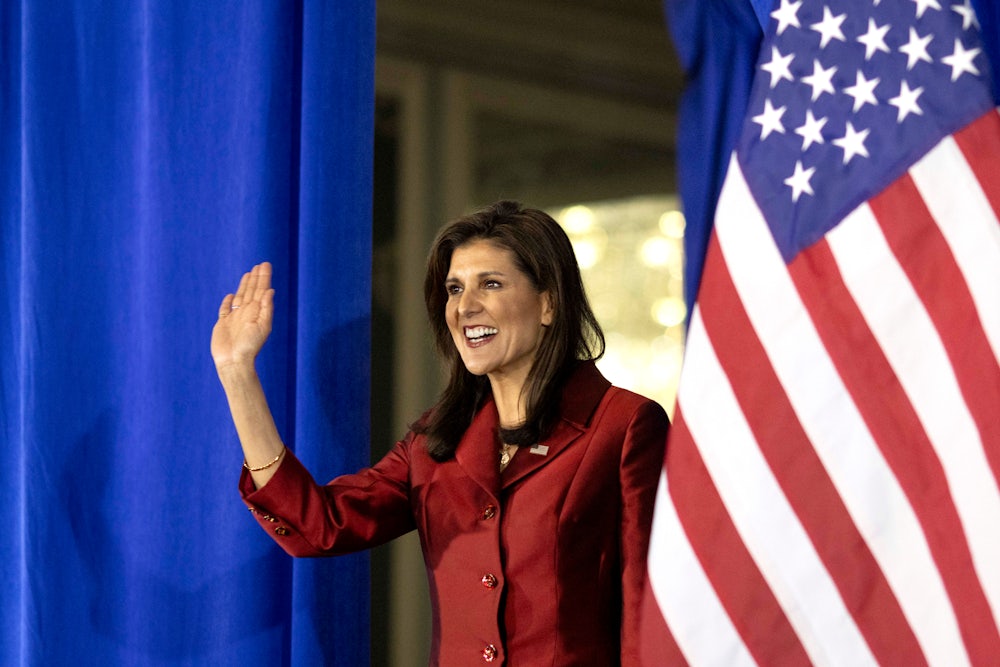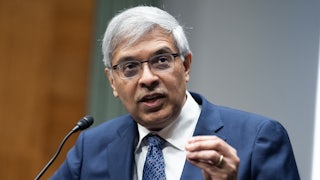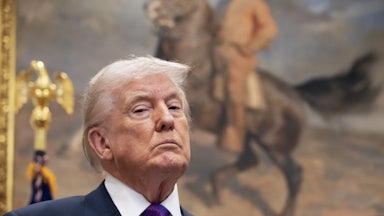Charleston on Saturday was a very
different place from Rock Hill, where Donald Trump had held
his election rally the day before. It was genteel and chic,
palm trees swaying over the boutique stores and cocktail bars of the historic
downtown, the gowned and suited guests at The Charleston Place hotel seemingly
unconcerned with mundane matters like elections. On the second floor of the
hotel, staffers for Nikki Haley, former governor of the state, Trump’s
appointee as ambassador to the United Nations in 2017, and now his only
standing rival in the Republican Party, managed the press registration desk
with brisk efficiency. Outside the Grand Ballroom, in a passageway that was all
soft carpeting underfoot and bright chandeliers above, uniformed hotel staff
set up tables of antipasti. At 7:00 p.m., Haley would appear in the Grand Ballroom
to give a speech to a core group of her supporters.
But Charleston, for all its easygoing air and elegance, was disturbing for what lay just beneath the surface. A short walk away was Mother Emanuel, the oldest Black church in the South, burned down in 1822, with one of its co-founders hanged on charges of plotting a slave rebellion; and it was where, in 2015, a 21-year-old white supremacist called Dylann Roof killed nine worshippers with a Glock handgun. The ghosts of colonialism and the plantation lurked close by if one knew where to look, in the way almost every guest in the hotel appeared rich and white and almost every hotel worker was a person of color. Inside the Grand Ballroom, still mostly empty, a large television had been set to Fox News, the presenter hyperventilating. Migrants, carriers of germs and “bringers of death to the American people,” were coming across the border in vast numbers. It was hard not to think of Roof, who had said, “You rape our women and you’re taking over our country,” before he opened fire.
At 7:00, the minute the polls closed, the networks declared the South Carolina primary in Trump’s favor. Fifteen minutes later, a text came in from Trump’s campaign, shouting “COMPLETE VICTORY!” The crowd in the ballroom appeared unfazed, their mood surprisingly upbeat as they swayed to honky-tonk and Southern rock, the loudest of them expensively dressed white women holding up signs saying “Women for Nikki.” The single table of Haley swag managed by two preppy-looking young women received the occasional visitor marveling over a Margaret Thatcher T-shirt, but it was the cash bar next to it that remained particularly busy. There was none of the fractiousness of the Trump crowd. The people I was looking at were the old wealth of Charleston, and they conveyed a sense of moneyed ease and the confidence that they could never lose, no matter the outcome of a particular election.
Haley appeared at 8:30, with straight hair and red dress and blindingly white teeth. Trump at the Winthrop Coliseum had been gladiatorial, and Haley stayed true to the role demanded by the Grand Ballroom. Her first words were drowned out, but the next ones were clear enough. She was thanking her family, her husband, her kids, her mother, her in-laws, “God’s strength and grace,” “the good people of South Carolina,” “our sweet state,” “America’s inherent goodness,” “citizens of the greatest country in the history of humanity.” The candied phrases dropped endlessly, were cheered enthusiastically, and the only interesting moment came when Haley declared that she was not dropping out of the presidential race in spite of Trump’s victory.
The never-Trumpers I had spoken to in Columbia had been lukewarm about Haley, and this in spite of their desperate desire for an alternative Republican candidate. Will Folks, a libertarian blogger who served as press secretary for South Carolina Governor Mark Sanford—and who claimed in 2010 to have had an affair with Haley, something denied by Haley’s office—explained to me that he was not going to endorse Haley. Although Folks had turned against Trump after endorsing him in 2016, he felt Haley to be all about “naked self-ambition” and “a puppet of the military-industrial complex.”
Inside the Grand Ballroom, Haley appeared not a puppet as much as an actor playing the part of an ambitious striver in a Netflix show about U.S. politics. She offered a little of something to almost everyone. Anti-Democrat signage and rhetoric was conspicuously absent, and the indications are that at least some of the votes she got in South Carolina were those of Democrats and independents. She was a moderate, a healer, and she would fight for “all of America,” she claimed. She was offering a real choice, something other than “four more years of Biden’s failure” and “four more years of Trump’s lack of focus.” She was a woman for women, a military spouse for the military, and the child of immigrants from India resolutely opposed to the “nine million illegals” with “enough fentanyl to kill every single American.”
She spoke for 15 minutes and stayed about as long to mingle with the crowd. Among the Charleston rich, almost entirely white, there was a sprinkling of sleek Indian faces. I spoke to one of them, a suave gastroenterologist who described himself as an independent and who had known Haley from well before her entry into politics. He had voted for Trump in 2016 and 2020, he said, and he had come to regret that. But Biden wasn’t “all there,” Kamala Harris was “useless,” and it was Haley he now pinned his hopes on. The child of an Indian diplomat who had immigrated to the United States in 1989, he was utterly opposed to the open border and the “illegal aliens” crossing it with impunity. “We all came here legally,” he said. That was a crucial distinction.
It made sense that the wealthy, upper-caste Indian elite would gravitate toward Haley. Born to affluent Sikh immigrants as Nimarata Nikki Randhawa, Haley has reinvented herself as a Southern white person. She is pro-military, pro-empire, pro-Israel, pro–Narendra Modi, pro-business, anti-union, and anti-abortion. The word “race” wasn’t mentioned once in her speech, but that too was in keeping with her position that business is more important than confronting South Carolina’s long, ongoing history of violence and immiseration against its Black population. Robert Greene II, an African American professor of history at Claflin University in Orangeburg, was present at the state capitol in Columbia on July 10, 2015, when, in the aftermath of Roof’s massacre at Mother Emanuel AME Church, the Confederate flag finally came down. Haley, Greene pointed out to me, had just the previous year—she was running for a second term as governor—said that the Confederate flag wasn’t an issue since no business had complained about its presence at the state capitol.
Haley’s rhetoric about America as a family similarly sidestepped all issues of significance. Her strategy in her bid for the White House is clear enough. She hopes that Trump will be convicted, that the legal issues swirling around him will prevent him for running for president, leaving her as the only viable Republican candidate. After that, in a dogfight against Joe Biden, she fancies her chances. Her campaign believes that she is excellent in televised debates and that her youthful vigor and girlboss persona will serve her well as she comes up against Biden’s aging white masculinity. “And she can always run again,” one of the Women for Nikki told me with a brilliant smile. “Can’t say that for the other two.” That is Haley’s belief, at least for now—that her pliability will get her past Trump, and then again past Biden, that her capacity to ride change will make her the winner of the ultimate prize in these ever-changing times. All that stands between her plan and its flawless execution is the changeable nature of change itself, and the fact that fortune does not always reward the shallow and the unprincipled.






